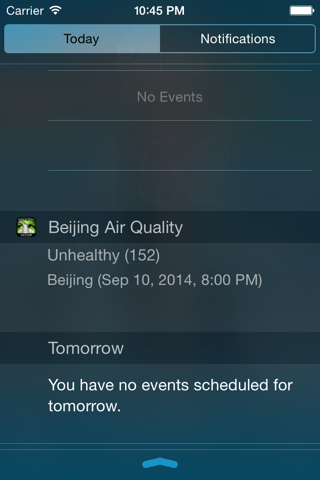
Beijing Air Quality US Embassy
View Air Quality in Beijing from US Embassy/consulate, as well as in Shanghai, Chengdu, Guangzhou and Shenyang. Now support Apple Watch.
- Add Today extension to iOS 8 Notification Center
- Update to more stable data source
- Forward info to SMS, Email, Facebook, Twitter, Weibo to share with friends
- Keep the same style with iOS weather forecast app
The data of this App comes from the live feed of US Embassy.
What is the Beijing air pollution index and what does it measure?
This is a live feed of air quality measurements from a monitoring station in the US embassy in downtown Beijing. The station measures PM2.5 particles. This means particles that are smaller than 2.5 microns in size, like soot from diesel engines. Research shows that these are the most dangerous pollutants. The first part is the date and time. Then comes the measurement, then an index that is calculated from the measurement, then a health impact rating. Anything below 100 is good, anything above 100 is a cause for concern. The feed shows the four most recent measurements in rotation (they are generally hourly), and todays average.
More information and research on the health risks posed by PM2.5 particles
What other kinds of pollution are in Beijing air and the risks
How to interpret the numbers?
The most important parts are the index and the rating. These are calculated according to US EPA (Environmental Protection Agency) guidelines
0-50 Good
51-100 Moderate (Unusually sensitive people should consider reducing prolonged or heavy exertion)
101-150 Unhealthy for Sensitive Groups (People with heart or lung disease, older adults, and children should reduce prolonged or heavy exertion)
151-200 Unhealthy (People with heart or lung disease, older adults, and children should avoid prolonged or heavy exertion. Everyone else should reduce prolonged or heavy exertion)
201-300 Very Unhealthy (People with heart or lung disease, older adults, and children should avoid all physical activity outdoors. Everyone else should avoid prolonged or heavy exertion)

